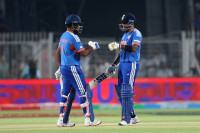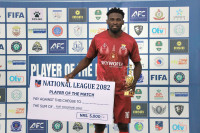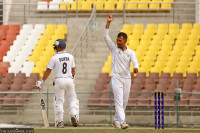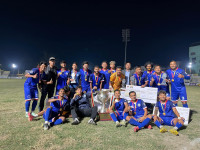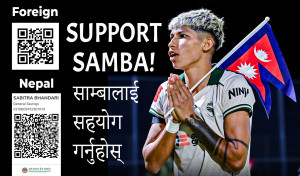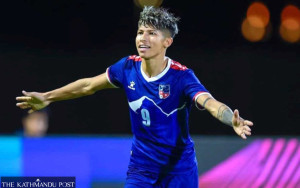Sports
Khadka, Bhandari named players of the decade
Jagat Tamata is declared coach of the decade and table tennis player Elina Maharjan wins peoples’ choice award at the NSJF Pulsar Sports Award.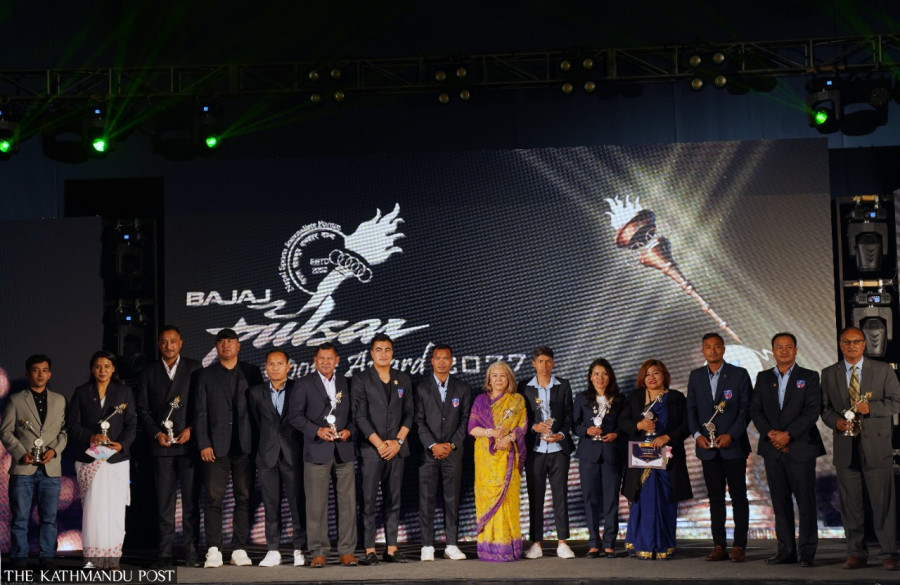
Sports Bureau
Former national cricket team captain Paras Khadka and star woman footballer Sabitra Bhandari were honoured with male and female player of the decade respectively at the annual NSJF Pulsar Sports Award held amidst a grand function at the Nepal Academy Hall in Kathmandu on Tuesday.
Cricket coach Jagat Tamata was named coach of the decade at the ceremony that awarded male player, female player and coach on account of their performances and achievements during the past decade unlike the previous editions that recognised the players on the basis of their performance of the past calendar year.
The award organiser Nepal Sports Journalists Forum, the umbrella organisation of sports journalists in the country, had already announced that they would reward the sports personalities in three categories reviewing their performance of the past decade instead of last Nepali calendar year considering that very few sports events were held due to the Covid-19 pandemic.
Table tennis player Elina Maharjan won the peoples' choice award that was decided through e-sewa voting, Facebook likes, points allocated by coaches and sports journalists among the five nominees. She secured 47.8 percent votes. National women’s football team goalkeeper Anjila Tumbapo Subba, shuttler Prince Dahal, cricketer Kushal Bhurtel and long distance runner Santoshi Shrestha were other nominees for the peoples’ choice category.
“I had already felt like a winner when I was nominated for the award,” said national women’s table tennis team member Maharjan, who is the double bronze medal winner at the South Asian Games (SAG).
Khadka, the most accomplished cricketer Nepal has ever had, announced his surprise international retirement last year in August. The all-rounder led Nepal’s elevation from a Division 5 team, the lowest tier of international cricket, in 2010 to their status as a one-day international (ODI) nation, the highest tier, in 2018—a rare achievement for any country in such a short period.
The middle-order batsman Khadka, who also bowled medium pace, enjoyed an illustrious career ever since he forayed into cricket. Khadka represented the country in the Under-19 World Cups in 2004, 2006 and 2008 while also being a part of the senior side. He took over the senior side in 2009 when he was 22 years old. He is also the first Nepali player to hit a one-day international hundred when he slammed 115 runs against the United Arab Emirates in 2021, besides scoring a T20I century.
“The credit for this award goes to my teammates as I am nothing without them. I thank my teammates and coaches for the award. I will remain involved in the game though I have announced retirement,” said cricketer Khadka.
Bhandari, the goal machine of the national women's football team, is regarded as one of the best forwards of the current generation of players at the South Asian level. She is the two-time silver medallist in Women's SAFF Championship and holds the record as the highest international goal scorer for Nepal with 38 goals from 40 games. The 25-year-old has scored far more goals than her highest scoring male counterpart's tally of 13 goals.
She played a key role in Nepal's runner-up finish in the Nadezhda Cup in Kyrgyzstan in 2019 and second-placed finish in Hero Cup in India the same year. Bhandari had scored both goals against India in their 2-1 win as Nepal achieved their first ever victory over their mighty opponents. She was also one of the key players for Sethu FC and Gokulam Kerala FC in 2019 and 2020 season and guided the teams to I-League titles.
Tamata was the coach of the national team when they gained ODI status in 2018. He mentored the team when Nepal qualified for U-19 World Cup in 2012 and 2016. He played a crucial role as a coach in guiding the team to the U-19 World Cup quarter-finals, the highest place Nepal has ever made to, among seven appearances in the global age group tournament. He also led the women's team to a bronze medal in the 2019 South Asian Games.
“The credit for the award goes to players and the success we achieved was the result of their hard work and dedication. I have been in cricket for the past 42 years and I promise to remain in the game my whole life,” said Tamata.
Long distance runner Pushpa Bhandari was honoured with performer of the year award for winning Dhaka Marathon last year. She was among a handful of Nepali athletes to participate in international competition in the year marred by Covid-19 pandemic.
Para-athlete Sarita Thulung got a par-athlete honour. The 37-year-old plays multiple games including athletics, swimming and wheelchair basketball. She became a victim of polio in her childhood.
Dr Ajay Rana was given a special award while the national men's football team that won Three Nations Cup last year in Kathmandu was conferred the team of the year award.
Kuwaiti sports journalist Satam Al Sehali was handed the Asian Sports Journalist Award. He is the president of AIPS-Asia, the international organisation of Asian sports journalists. AIPS-Asia general secretary Amjad Aziz Malik received the award on his behalf.
The winners of male, female, coach and peoples' choice awards were given a Pulsar motorbike each while the winner of all other categories carried home a purse of Rs50,000 except the journalist award.
Late Shah receives golden salute award
Sports administrator late Sharad Chandra Shah was feted with a golden salute lifetime achievement award.
Shah, who died in July 2012, is credited for introducing modern approach to Nepali sports and construction of major sports infrastructure in the country during his 11-year tenure from 1977 to 1988 as National Sports Council member secretary.
Saha's wife Renu Shah received the award. Shah introduced the National Games in Nepal and was also a mastermind behind the birth of the sub-continental South Asian Games (SAG). It was under Shah's leadership the first ever SAG known as South Asian Federation Games (SAFG) then took place in Kathmandu in 1984.
Apart from National Games, he also initiated Inter City Sports in the country and played a key role as executive head of National Sports Council (NSC) in constructing covered halls in all 75 districts of the country. It was under his tenure that the country saw construction of stadiums in all five development regions of the country.
In the 1988 Seoul Olympics, Nepal sent 17 athletes in the Games in comparison to six in the Tokyo Olympics last year and his tenure in sports is considered a golden period in Nepali sports. He resigned on moral ground in 1988 after a stampede at Dasharath Stadium claimed the lives of at least 72 people during a football match.
He, however, was a controversial figure in Nepali politics.




 11.84°C Kathmandu
11.84°C Kathmandu